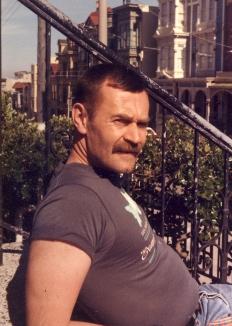AIDS Vancouver co-founder Bob Tivey is being remembered as a fearless and compassionate man who took on government and conservative elements of the gay community in the early days of fear and confusion around the then-burgeoning AIDS epidemic.
Tivey died peacefully in his sleep on March 18 at a Toronto palliative care home after a battle with cancer. He was 68.
Gay activist Jim Deva says Tivey, the first executive director of AIDS Vancouver, was unafraid to tackle the issue of AIDS and the almost unknown concept of safer sex when so many men were living in fear of what was then a mystery disease.
“Tivey was there — the right man, the right time and exactly the right message,” Deva says. “He made it more of a concern than a panic.”
Deva relates a story of a friend who had contracted AIDS and was scared. He took the friend to see Tivey, who met with him privately.
“He came out and was able to deal with his life,” Deva says. “He did important stuff. He was remarkably human and caring. I will adore him forever.”
Deva says Tivey became the face of AIDS in Canada at a time when the gay community was ducking and dodging issues around it.
“No one knew what AIDS was and he put a face to it,” Deva says. “What he did was bold and brave.”
Tivey was born in Lincoln, England, on Jan 31, 1943, eldest son of Robert William Arthur Tivey and Lilian Mundin. He came to Canada in 1954 on the Empress of France, debarking in Montreal.
Tivey began his working life designing jewellery. He moved to BC in 1976 and began working in various hotels and at the Insurance Corporation of BC. He eventually became an insurance adjuster.
It was volunteer work that led him to AIDS Vancouver.
In 1999, Xtra ran a piece by Los Angeles activist Tony Valenzuela entitled “Barebacking is a Cherished Act.” Valenzuela spoke of the relief of being diagnosed positive — “a double-edged sword that slices away the anxiety and hard work of staying negative, but forces one to face mortality.”
Tivey responded, “For Tony Valenzuela to argue that being HIV-positive and having peace of mind is preferable to worry and concern about being disease-free is totally bizarre and frightening to me… The politics of HIV are out of whack. Stop the world, I want to get off.”
It was an attitude that permeated much of his work.
Tivey was James Johnstone’s first partner. Johnstone recalls those early days well and Tivey’s work in the face of ignorance, fear, homophobia and daunting challenges, many from within the gay community itself.
“Everybody was flying by the seat of their pants back then. He had no training. He was going out of his dedication to the community. He was very fearless,” Johnstone says. “Bob was bigger than life. He led a rather amazing life that spanned a time when the community was closeted, pre-Stonewall, to a time when the community was out.”
In 1987, Tivey was fired from AIDS Vancouver for wanting to take a stand on proposed provincial legislation from then-BC premier Bill Vander Zalm that would have allowed people with AIDS to be quarantined, under an amended provincial Health Act.
Tivey told The Vancouver Sun at the time that, since AIDS Vancouver would not take an advocacy position, another group willing to deal with issues concerning AIDS was needed. He went on to form the Stop AIDS Project to focus on “a new way to educate people in high-risk groups about AIDS.”
“It will be about getting in touch with one’s emotions about the epidemic, how it has changed one’s life; talking about safe sex and how to negotiate a safe-sex encounter; and talking about ways to stay healthy,” he told The Sun.
When Vander Zalm proposed celibacy programs for BC high schools rather than promote condom use as a defence against AIDS, Tivey called it “criminal to hold back information that could make a difference between life and death.” He fought to have safe-sex advertisements on television, despite opposition from private broadcasters who thought they promoted casual sex.
Johnstone says Tivey was fearless, even taking on those in the gay community who thought being outspoken would lead to funding cuts or repression. “It was really wild, pioneer scary times. Bob rose to the occasion.”
Former Vancouver alderman Gordon Price was among the founders of AIDS Vancouver with Tivey. He says Tivey made a “tremendous personal commitment to AIDS Vancouver.”
In 1985, Tivey and a group of volunteers planted three cherry trees near the W Georgia St entrance to Stanley Park to commemorate three gay men who were among the first to die of AIDS in Vancouver: Cedar Debley, Ray Scott and Gaëtan Dugas.
Tivey was predeceased by his parents and leaves behind two sisters and a brother and their families, as well as members of his chosen family: Bob Hilcox, Paul Christie of Toronto, and James Johnstone and Richard Rooney of Vancouver.
Tivey will be cremated and his ashes scattered in Toronto’s Necropolis Cemetery.

 Why you can trust Xtra
Why you can trust Xtra


